Workshops
The Bachelor of Arts (Fine Art) has a two stage enrolment process in 2019. In stage one, you will enrol via Enrolment Online into our courses for semesters one and two. Please check stage one is complete before proceeding. In stage two, you will select your semester 2 classes for Fine Art Studio, Workshop and ART: History+Theory+Cultures via a preferencing process system.
This page will assist you with stage two of the enrolment process. Here you will find a list of potential semester 2 Workshop classes. (Note: There is a separate page for Fine Art Studio classes and a separate page for ART: History+Theory+Cultures classes.)
You will only take one Workshop class in semester 2, but you need to list two (2) preferences. These workshops will be for both first and second year students and will be offered under the following course codes:
Workshop 2 VART 3650 (1st year students)
Workshop 4 VART 3652 (2nd year students)
These are the course codes you enrolled into in stage one of the process.
Read the list below carefully and select two (2) Workshop classes you would be happy to take for semester 2. The 2019 preferencing process will be communicated to you by email at a later date.
Remember, these Workshop classes are 12 credit point courses and will require 3 contact hours per week plus associated learner directed hours.
IMPORTANT PLEASE NOTE: You must not repeat any class in your preference lists. Every effort will be made to place you in your first preference classes.
Although we would like to offer all of the Workshop options below, classes are subject to viability and may not run if numbers are too low.
Course Information
Offering Studio & Studio Lead
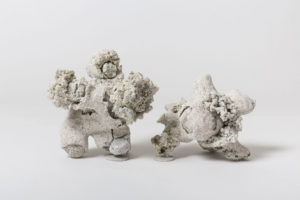
Narelle White, 2018, Ceramic, Photographer: Janelle Low
Clay as Vibrant Matter
Clay is an irresistible material with endless making potential. This subject is a playful and explorative approach to clay in its many forms: liquid, plastic, hard and fired. Students will be guided through series of projects asking the material: What if? This subject has the potential of creating alternative or unimagined outcomes.
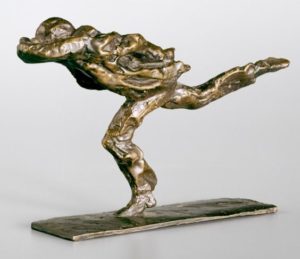
RICK AMOR RUNNING MAN, 1989, NGV COLLECTION Margaret Stewart Endowment, 1991
© Rick Amor/Licensed by Copyright Agency, Australia
Foundry
In this course you will develop practical skills across a range of processes and materials commonly used in sculptural practice in the bronze foundry. You will be introduced to methods and materials involved in lost wax casting in order to make small bronze works. This method involves the completion of a series of steps from wax modelling, plaster and sand investments, melting and pouring bronze, finishing and patination. You will undertake these steps in sequence and as a group and this will require hands-on attendance at all classes. The course is mainly practical but with appropriate tutorial presentations covering theoretical and relevant historical background.
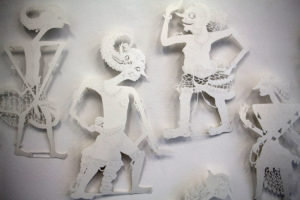
Image Credit: Sangeeta Sandrasegar, ART-at-Berlin---Courtesy-of-Michael-Reid Gallery
Drawing Cultures
In this course you will be introduced to local and global ideas examining intersections of visual cultures and drawing practices. Linking theory to practice this course will develop your formal and conceptual understanding of drawing from the personal to the digital. You will be encouraged to reflect on this as a primary point of investigation within international contemporary art practices. The objectives of this course are to understand how knowledge and making are linked through ways of seeing and thinking, to investigate pictorial languages and approaches to communication through the making of creative works, and, to relate critical concepts, texts and practices to your studio production.
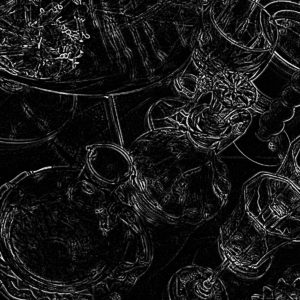
Irene Barberis, charcoal on paper (detail)
Drawing & Perception
In this course offers you will be provided a structured drawing program in all facets; techniques, refinement of general drawing skills, approaches to seeing, thinking and perception. It encompasses life drawing and general drawing including aspects of the figure, perspective, pictorial composition and the investigation of self and personal vision. You will produce a folio of resolved drawings with a support folio of studies and research material that are relevant to a range of areas of study. You will examine formal conventions of drawing, historical contexts and its capacity to communicate expressively across a range of media.
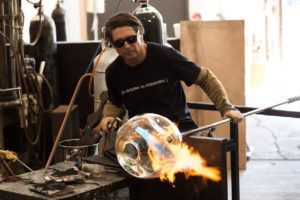 Image courtesy of Melbourne Glass-works
Image courtesy of Melbourne Glass-works
Hot Glass Workshop
This workshop seeks to generate self-motivated and critically informed artists, craftspeople and designers who utilise hot glass as a medium through which to express their ideas. The glass workshop is structured to expose students to a diversity of approaches in utilising hot glass and its unique qualities. The aims of the glass program are: to ground students in the historical aspects of the material, to encourage the development of the necessary skills for working the material in a wide range of applications, to cultivate a contemporary dialogue of issues informing practice, to promote individual exploration within and between media and to assist and equip students with the necessary skills for working as professional artists.
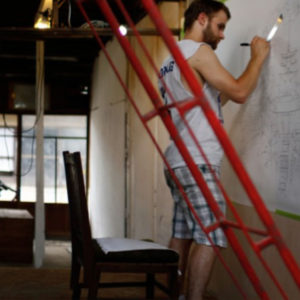
Student on site, Tammy Hulbert
Internship - CANCELLED
In this course, you will participate in an internship or artist in residence program in an arts or cultural organisation, company, festival, gallery, museum or studio, through dual negotiation with the industry and the School of Art. You will be expected to work as directed by the host organisation, to address and solve real issues in an arts industry workplace environment.

Wall, 2019 - photograph - Phil Edwards
Looking For Abstraction In The World Around You
In this workshop you will explore the world around you to discover ideas leading to concepts of abstraction. You will locate and document a vast collection of existing abstract surfaces, patterns, colours, stains, architectural features, marks, texts, signs, symbols, gestures, and grids. You will investigate natural and urban sites and use photography, drawing, frottage (textural rubbings) and painting to record and research stimuli and materials that you will reinterpret into mixed media, paintings, drawings, prints, objects, photo works or installations. Consultation with lecturer will lead to individual projects, and resolved works based on extensive research. You will explore ideas of abstraction and processes with a focus on chance, composition, balance, matter, colour, surface, and materiality. You will contribute to a collaborative Instagram site. Intensive studio experimentation will be encouraged, group tutorials and student presentations will be essential to the development of the research undertaken by participants in this workshop class.
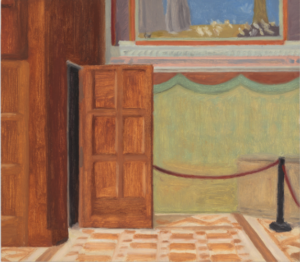
Eleanor Ray, Assisi (Saint Francis and the birds) 2016, oil on panel 6 x 7 inches
Painting Ideas & Methodologies
In this advanced painting workshop, you will gain knowledge and experience in established and experimental painting techniques, skills and concepts. You will experience a wide range of materials and production processes to create artworks relating to painting with an emphasis on experimentation, conceptual development and studio research. The course is structured through demonstrations & technical experimentation followed by generalised thematic projects and advanced individual self-directed projects. The technical experiments enable you to produce works that complement your own studio practice. Ideas include: the preparation and use of supports and grounds for a variety of painting methods including oil, acrylic and water colour, working from observation, colour and grisaille, tonal painting, the contemporary portrait and still-life, under-painting and glazing. Major contemporary themes include the relationship of painting to photography, hybrid painting, painting deconstruction and painting and materiality. Individual and group tutorials, discussion and feedback sessions, studio demonstrations and studio health and safety complement this painting workshop
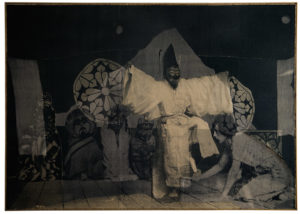
DAVID NOONAN, TWO MOONS, Screen print on linen, 2009-10
Photographic Screen Printing
This course will introduce you to screen-printing processes and technologies that focus on photographic and text based printing. The objectives of the course are to provide you with the skills and knowledge to: produce photographic screen-prints; reflect upon the role of photographic screen-printing in contemporary art; and expand the aesthetic and conceptual possibilities of your art practice.
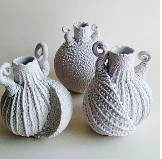
Garry Bish, 2018, Ceramic, Photographer: Artist
Plaster Moulds & Ceramic Multiples
In this course you will develop moulding skills and explore the mould as a basis of experimental alteration in order to develop and evolve unique objects. Conceptual, perceptual, formal and aesthetic concerns will be addressed as they relate to object making and assist you to develop an individual approach to ceramic object forming using moulding processes.
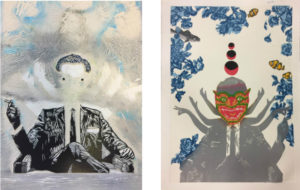
Bow Vacharussiriyuth, reduction linocut in progress, 2016
Print (Re)Generations
In this course you will explore ways in which contemporary print processes can inform traditional print production and vice versa. Sourced materials/imagery, photographs, historical references and hand drawings will be mediated through Photoshop or collage. You will generate conceptually and visually coherent working drawings, collages and proofs which will, in turn, inform the production of original prints that utilise the reduction linocut processes. Notions of appropriation, quotation, recycling and hybridity will be embedded into explorations of the unique possibilities offered by various print generations. You will also investigate the ongoing dialogues between historical and contemporary methods of print production.
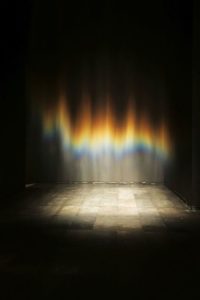
OLAFUR ELIASSON, BEAUTY, 1993 SAN FRANCISCO MUSEUM OF MODERN ART,
Projection Light and Optics
In this course you will explore the possibilities of light, lighting and projection, experimenting with old and new projection technologies such as the Camera Obscura, Camera Lucida, overhead projection, contemporary digital projection and film/video lighting kits both as a developmental tool for making art and a mode of display.
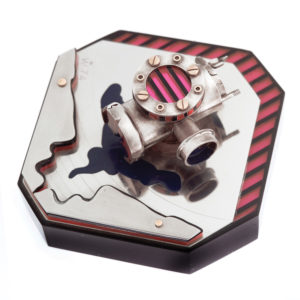
Wolf Wennrich, Object, 1974, silver, acrylic, steel, brass. W.E McMillan Collection Photo by Margund Sallowsky
Small Object Mechanics
In this workshop students will investigate the notion of the jewellery object mechanism as both concept and process, specifically for the construction of small scale wearable and non wearable objects. Attachments, articulations and joining methods in metal and alternate materials will be investigated to develop your perceptual, formal and technical abilities when making jewellery and objects with connecting and moving elements.
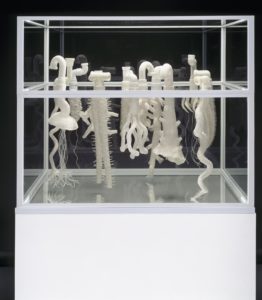
Fiona Hall "Dead in the Water" 1999
National Gallery of Victoria, Melbourne. Purchased, 1999
© Courtesy of the artist
Soft Sculpture
This course focuses on the possibilities of making soft sculpture within a contemporary art framework. Students will undertake a series of short workshops which introduce a variety of conceptual and technical skills including basic pattern making, working with scale, hand and machine sewing, armature construction and the use of ready-mades. These skills will be contextualised by the works of a range of artists from Louise Bourgeois and Yayoi Kusama to Australian artists Brooke Andrew and Kate Just. Students will develop their own works using a range of pliable materials and are expected to develop new experimental approaches and definitions in the production of soft sculpture.
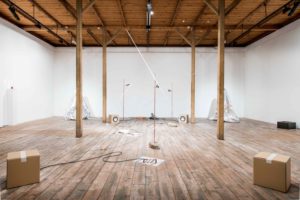
Michael Prior Slow Air (2016) Project at Anna Pappas Gallery
Sound Art
In this course you will explore historical and practical aspects of Sound Art practice. Combining the techniques of environmental recording, studio recording with found objects and materials to create sound compositions and installation. The course encourages you to develop skills in critical listening and a dialogue between your studio practice and the history of Sound Art, as they relate to installation, composition, performance and other audio modes of exhibition and distribution.
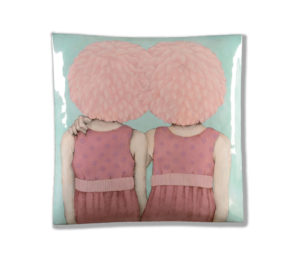
Jessica Calderwood, Coupled II, enamel, copper, china paint, 2017
Surface Enamels - CANCELLED
In this cross disciplinary course students, will focus on small scale enamelling for all artists. Vitreous enamel surfaces provide jewel like qualities and lustrous colours. Students will research individual subject matter to create their own personal iconography in enamel. Students will learn how to translate their drawings and apply enamels to metal surfaces using process such as stencilling, sifting, drawing, painting, foiling and sgraffito.